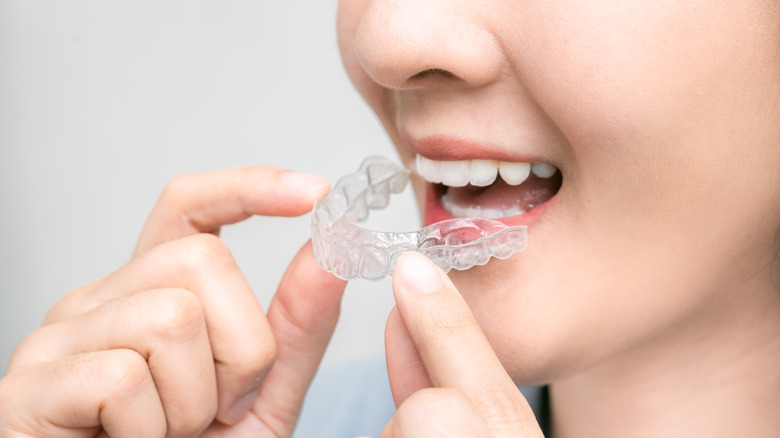Teeth grinding, or bruxism, is a condition that can cause you to clench or gnash your teeth, either when you’re awake or asleep (via the Mayo Clinic). If your teeth grinding is severe enough, it can cause tooth damage, headaches, and disorders of the jaw. In these cases, your doctor or dentist may recommend a mouth guard, which you can wear while sleeping, to prevent tooth grinding (via Medical News Today).
According to the American Dental Association (ADA), there are several different mouth guards you can get, although the best option is one that has been custom-made for you by your dentist. However, in lieu of a custom job, you can also get what’s called a “boil and bite” mouth guard, which is softened in boiling water and then inserted to allow it to adapt to the shape of your mouth. If you’re looking for something fast and cheap, the ADA says that you can pick up a stock mouth guard, which comes pre-formed. The downside of these is that they tend to be bulky and do not fit very well.
Wearing a mouth guard should not cause any pain, but there are some instances when a mouth guard can actually make your symptoms worse (via Dentaly). If you’re waking up with sore teeth, even after sleeping with a mouth guard, you may have to rethink your situation.
Your mouth guard might not fit

If you’re waking up with an aching jaw, the first problem could be that your mouth guard is not properly fitted to your mouth (via Markham 7 Dental). It could be too large or too small, thereby not giving you the nightly protection your teeth require. In these cases, you should see a specialist in order to have a custom-made night guard created for you.
In other cases, a mouth guard can actually cause your teeth to shift, leading to jaw misalignment (via Dentaly). This can also happen in cases where the mouth guard has not been custom-made to your mouth. According to Oaks Dental Korea, using an over-the-counter guard or a guard that only covers the front teeth will lead to excess pressure being placed on the back teeth by your jaw. As a result, the back teeth will shift and become misaligned. A custom-made guard will not only help keep your teeth protected but will also keep that extra pressure off your jaw.
It’s important to get to the cause
A night guard can be a good measure for helping to deal with some of the symptoms of bruxism, but it can’t address the cause (via Mill Creek Dentistry). According to Johns Hopkins Medicine, one of the primary causes of nighttime teeth grinding is stress. People who are overly tense, nervous, or easily frustrated can be affected, as well as people who are overly competitive or who have aggressive tendencies.
Usually, your doctor can diagnose bruxism by examining your teeth and jaw muscles, but in some cases, a sleep study might be necessary in order to make a proper determination (via Cleveland Clinic). And, in addition to a night guard, you may want to take steps to reduce stress in your life. Meditation, exercise, or even cognitive behavioral therapy can help ease some of your daily tension and make your nights a little more pleasant. Talk to your doctor or your dentist about your options when it comes to a mouth guard at night. The right mouth guard might help spare your teeth from grinding and help you wake up feeling pain-free.